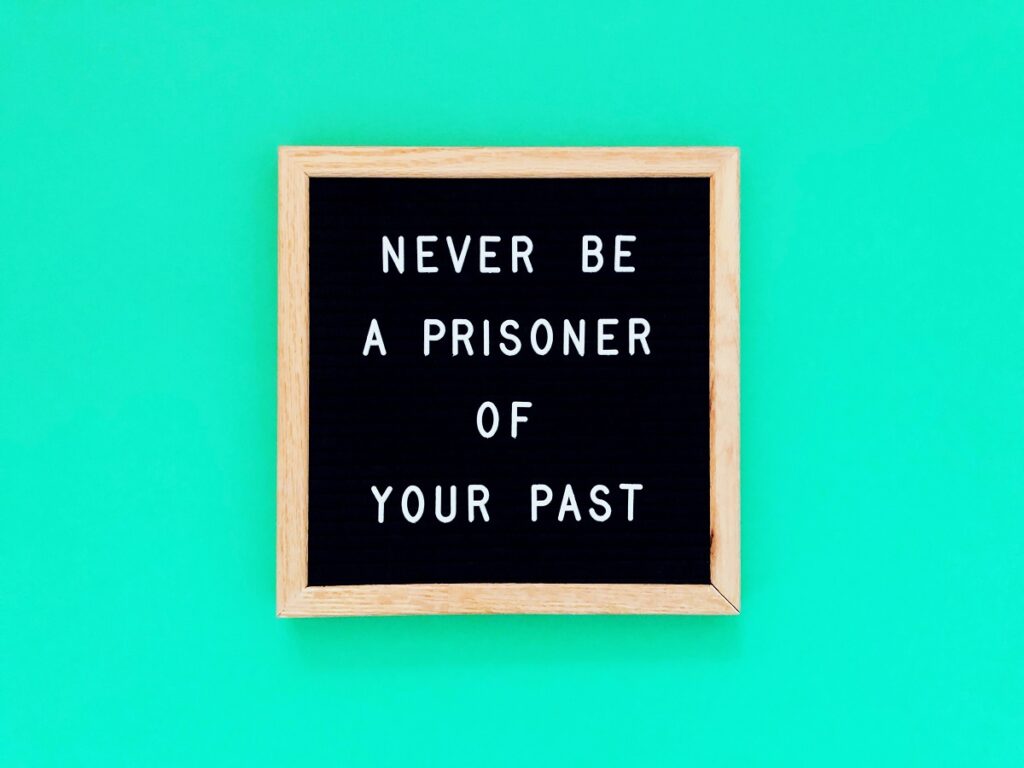Reflecting on our past and learning from it is a normal process we all go through. Remember that while we can’t change the past, we can choose how we think about it and how it affects us now.
However, I know it’s easier said than done.
The past can “hunt” us for many reasons. We may have unresolved past issues or emotions. It may also be because we can’t let go of memories or regrets. If you’re having trouble moving on from past relationships or experiences, I get it.
Talking to a mental health professional about your past haunting may help. They can help you cope with negative emotions. But what if you can’t reach out?
In this post, I’ll share five things that helped me deal with my past and improve my life quality. Ready? Let’s begin!

Photo Credits By Envato Elements
You Obsess Over Past Events
Yes, if you’re stuck in the past and can’t let go of past events or experiences. It’s normal to think about the past and have memories, but if you’re unable to enjoy the present because of it, it may be a problem.
Therapy or talking to a close friend or family member can help you process past emotions. Setting short-term goals and working toward them may also help.
You Can’t Make Decisions
You may be stuck in the past if you can’t make decisions or act in the present. For example, maybe you subconsciously wish things were just as they were in the past, which means no present decision would be as good.
Try to remind yourself that you can’t change the past actively. Instead, focus on what you can control now and make positive changes.
Setting short-term goals and working toward them may also help. If you’re having trouble making decisions, talk to a trusted friend, family member, or therapist about your past and how it affects your ability to move forward.
You’re Still Holding Grudges
Holding grudges from the past can be emotionally draining and prevent you from moving forward. If you can’t forgive past events or think about the people no longer in your life, you may be stuck in the past.
Identifying and processing your grudges and resentments can help. This may involve talking to the person(s) involved or working with a therapist to process your feelings.
Forgive yourself and others. This doesn’t mean you must forgive or forget, but it can help you overcome negative emotions and move forward.
You Compare Relationships
You may be stuck in the past if you compare new relationships to old ones and find them difficult. It’s natural to compare new experiences to past ones, but if you’re having trouble forming new relationships because of this, it becomes a problem.
The solution may involve actively reminding yourself that each person and relationship is unique and that different experiences and connections are okay. Try to be open to new experiences and get to know people without comparing them to past relationships.
Counseling or self-improvement may help you form new relationships.
Remember: it’s normal to have fond memories of the past and compare the present to them, but if this is preventing you from enjoying the present, it may be a problem.
You Can’t Find Joy in The Present
Focusing on the present and appreciating your blessings can help. Reminding yourself of the positives and practicing gratitude may help.
Setting goals for the present and working toward them can give a sense of purpose and satisfaction. If you’re having trouble enjoying the present, a therapist or positive coping strategies may help. Meditation is a great tool, and our blog has plenty of resources too!
You may be stuck in the past if you just can’t enjoy the present anymore. The solution? Set goals for the present and work toward them, or find activities that bring you joy and satisfaction in the present.
Try to let go of the past and work through any negative feelings about it. Talking to a therapist, your best friend, or a family member about your feelings may help. Mindfulness, which involves accepting the present, may also help. This reduces past preoccupation and increases present engagement.

How Can You Start Living in The Present Moment?
In 2023, there are many ways to heal and move on with your life, including:
- Acknowledge your feelings: Validate your past feelings. Discussing your experiences with a therapist, a dear friend or family member may help.
- Self-care reduces stress and improves well-being. Exercise, sleep, a healthy diet, and fun activities may help.
- Seek help: Having friends and family to turn to for emotional support can be helpful. A therapist can help you process your past emotions in a safe and supportive environment.
- Forgiveness is challenging but liberating. Forgiveness doesn’t mean forgetting or reconciling, but it can help you let go of negative feelings and move forward.
- Setting goals for the present and future can give you a sense of purpose that anchors you in the present moment. Set short-term and long-term goals and take small steps to achieve them.
- Practicing gratitude can change your perspective and boost happiness and contentment.
Be patient with yourself—healing from the past takes time. If you’re having trouble coping with past emotions or events, get professional help.
What Are The Signs You Need Professional Help?
One indicator is obsessing about previous events, even if they occurred long ago. When you think about those events or people, sadness, regret, and rage often come along.
Another clue might involve trouble making new friends or hanging onto prior experiences that affect their everyday life. If someone suffered a traumatic incident and now avoids specific locations or circumstances because it causes memories or anxiety, they may require professional counseling.
If a person is struggling to deal with prior experiences and adopting harmful coping techniques like drug misuse, overeating or undereating, or self-harm, they may require counseling to learn healthy ways to control their emotions and behavior.
Insomnia, irritation, and even physical symptoms like headaches or muscular strain might result from trouble letting go of the past. If unresolved prior events are causing these symptoms, treatment may be helpful.
Therapy may help people let go of the past. A therapist may help people process their emotions, address conflicts, and build healthy coping skills. If you or someone you know is experiencing these indicators, get mental health care.
Your Takeaway
This article should help you recognize indicators of your problems moving on from the past.
It’s common to feel trapped or unable to let go of the past. You may need professional treatment if these symptoms continue and disrupt your life.
If you’re showing any of the indicators, talk to a therapist. They may help you address challenges, process emotions, and build healthy coping skills.
This approach requires self-care. Self-care involves enjoying and relaxing. Exercise, family time, and hobbies are examples.
Healing takes time, so don’t rush. Ask for assistance and be patient.
In conclusion, understanding the symptoms you’re trapped in the past is the first step to moving ahead and enjoying a better, more fulfilled life. This article should help you recognize these indicators and seek assistance.
You might be also interested in: Too Worried About Your Future? Here’s How to Stay Present









